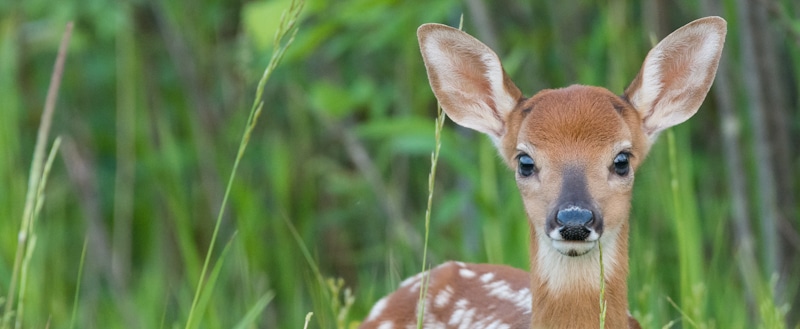You may consider that both words “Fawn” and “Faun” are the same when writing them out in a statement. While in reality, you would be mistaken to use them interchangeably, given that they represent something entirely different and should be used individually when writing.
“Fawn” and “Faun” are completely different words with contrasting meanings divergent from one another when used in a sentence. “Fawn” can be used as a proper noun and verb, while “Faun” is referred to as a mythological creature found in many literary works.
How they are used even changes the entire understanding of the sentence. It is very common that people consider that these are the same but the truth is their use in a sentence and the context in which they are used reflect varying ideas. So let us explain how and when “Faun” and “Fawn” diverge completely from the other word’s meaning.

How To Tell Whether To Use “Fawn” or “Faun?”
Generally, the similarity in the pronunciation of “Fawn” and “Faun” doesn’t surprise a person. However, the way how both of these words are written in a sentence, sometimes completely confuses both the reader and the writer. To understand the difference, it is essential that the meaning of these words is properly grasped.
“Fawn” is used when speaking of a deer with an age less than 12 months or commonly refers to a lighter shade of the color brown. See a couple of examples of the word “Fawn” being used correctly in a sentence below:
- The golden fawn of her eyes truly beautifies her every facial detail.
- It is very inhumane to hunt a fawn for prize money.
In the examples above, you would quickly be able to grasp the understanding of how the word “Fawn” was used that in comparison is generally misspelled with “Faun”. Well, the word “Faun” basically represents a numen satyr of Roman and Greek mythology. This is one of the most obvious differences that completely illustrates how these words are used in a sentence and here are some examples of it:
- The statue of the Faun in Rome usually surprises the foreigners.
- Most people don’t know what the Faun represented in Roman mythology.
In this instance above, the word “Faun” highlights a clear figure as compared to the word “Fawn” which is quite contrasting from the sentences mentioned above. It is critical for you to know how to use both of these words in your sentences, since it can ultimately change the entire understanding and foundation of what is being said. Not only that, without knowing the meaning, you might not be able to convey the actual point of your sentence at all.
Other than that, the manner in which these words address different meanings in various contexts will be explained. Let us get right on ahead to know where the criteria changes with respect to when the words “Faun” and “Fawn” are used in a sentence.
Is it Fawn or Faun? When Do I Use Them In A Sentence?
Strangely, when using the words “Fawn” or “Faun” in a sentence, it is likely you won’t immediately place them in the appropriate context in which you are using either of them. This happens especially if you are not familiar with their differences and how much it can alter the meaning of an idea expressed in writing.
A simple example of this situation would be when you type the sentence “I don’t consider that you should learn about hunting a fawn.” Here it appears as if the hunt is open for the satyr deity. Now, in this example, the context completely changed whereas the word “Faun” should have been used. Here are a few common ways to differentiate when to use “Faun” and “Fawn”
-
“Fawn” is Common Whereas “Faun” is Specific
In major sentences, you might be referring to the word “Fawn” because it doesn’t only have one meaning when used in a sentence. It can have a dual meaning when used as a noun as mentioned above. For instance,
- Do you think it is justified to kill a fawn in front of the children?
- You shouldn’t wear a lens as it hides the golden fawn of your eyes.
Contrastingly, Faun specifically represents a distinct prominent figure which is why it is specific. For instance,
- Some people believe that the Faun watches upon them on lustful acts.
- The sculpture of the Faun truly horrified him for some reason.
Keeping in view this main difference, you might be able to fully ascertain the fact that both these words do in fact resonate a different aspect when they are used in the varying statements.
-
Fawn Can be Used as Verb While Faun Can’t be
The entire understanding up till now was indeed based on the fact that the word “Fawn” is used as a noun. However, the case can also vary that it can also be used as a verb when you are addressing attention-seeking through acts of flattery. For instance,
- You must admit that the boys try to fawn over you.
- It is easy to tell that a person fawns over you when they don’t stop talking.
When we use fawn as a verb as provided in the example above, the entire sentence radically gives a newer understanding of a different theme. However, the same can’t be said for the word “Faun” as it can only be used as a noun.

Although there are other ways to identify the conclusive differences between the two words, these two main ways accurately address when to use them in a sentence. You may be able to cover almost all such varying cases from the main understanding of the two points mentioned above. But it is necessary that you are able to fully interpret the point of view in the statements that are provided.
However, apart from when and how to use these words in a sentence, you may have noticed various instances in the examples above that at multiple instances when fawn wasn’t capitalized. Along with that, you must now also feel the need to know the various cases in which we are supposed to capitalize or not capitalize the words. So let’s look at the case as to why and when the words will be capitalized.
Is Capitalization Important for The Words “Fawn” and “Faun”?
You might not realize that this question is far more important after learning the entire differences between the two words. While most people quickly understand the idea, most of them will instantly make another grammatical error that is regarding the capitalization of the words. It isn’t safe to say that you won’t make the same mistake as others.
Normally, “Faun” in all aspects means the same as its defined meaning. As it is specific in terms of nature, hence it will be capitalized in almost all cases. For instance,
- Keep an eye out for the Faun Statue.
- He is thinking of making a Faun sculpture.
Before you jump to the conclusion that the word “Fawn” won’t be capitalized as the word “Faun” is capitalized then that is entirely inaccurate. There are certain cases and areas when even the word “Fawn” is actually capitalized.
-
The Word is the Initial Set of Characters In a Sentence
This rule applies in both cases when the word “Fawn” is used as a noun and even as a verb. However, you will rarely experience certain sentences when the word “Fawn” is the first word in the sentence and is acting as a verb. For instance,
- Fawning over girls is a real bad habit as per my opinion.
Now, this example clearly illustrates that even the word “Fawn” will be capitalized when it is the starting word of the statement.
2. Fawn is Within Quotation Marks
Another common capitalization rule that applies to the word “Fawn” is that whenever it is present within the quotation marks, it will be capitalized. You will widely observe throughout that whenever we have used the word “Fawn”, we have capitalized it in the quotation marks. For instance,
- James told heather how to use the word “Fawn” in a sentence.
Such rules of capitalization along with how and when to use these words will clarify all your concepts from different angles. In this manner, you won’t feel ashamed or shy when using these words. It is also critically important for you to remember that the context matters a lot because as long as you know the context of the sentence then you won’t feel hesitant in using such words.

So, Does it Mean That “Fawn” and “Faun” are Different?
Yes, it is cleared that both these words are different from the other in every single aspect such as meaning, context, and even their capitalization. So, when using any of the two in writing you will know which is the right one depending on the context you are writing about.
Now you can feel confident whenever you consider the need to boast about your higher understanding.
Shawn Manaher is the founder and CEO of The Content Authority. He’s one part content manager, one part writing ninja organizer, and two parts leader of top content creators. You don’t even want to know what he calls pancakes.

